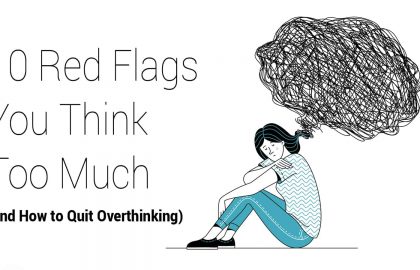Coincidence:
- a remarkable concurrence of events or circumstances without apparent causal connection.
- correspondence in nature or in time of occurrence.
~ Oxford English Dictionaries
Carl Jung was once beside himself trying to explain why coincidences occur.
“To grasp these unique or rare events at all, we seem to be dependent on equally “unique” and individual descriptions,” writes Jung. “This would result in a chaotic collection of curiosities, rather like those old natural-history cabinets where one finds … fossils and anatomical monsters in bottles, the horn of a unicorn, and a dried mermaid.”
Jung often used humor to mask frustrations, as can be seen.
Like many of history’s greatest experimenters, Jung was borderline-obsessed with procuring a scientific explanation for happenstance.
But is there such an explanation?
Let’s delve into what science has to say on the subject.
Scientists Explain The Meaning Behind Coincidence
Pattern Recognition
First, the human mind is incredibly adept at pattern recognition. In cognitive neuroscience, pattern recognition describes a process wherein the brain associates information from a stimulus (external cue) with something in our memory.
Pattern recognition almost certainly evolved over the millennia as a survival mechanism. To illustrate, let’s say you’re out on a leisurely stroll through a beautiful backwoods area. For the briefest moment, your eyes fixate on a squiggly, shadowy figure in the grass. Your very first instinct is to become startled and walk (fall?) backward.
There’s no rationality involved in such a situation – it’s all instinct. The brain notices patterns – and thus, astounding coincidences – because of this evolved chemical reaction.
“The law of very large numbers”
In 1986, 32-year-old Evelyn Marie Adams won the New Jersey state lottery twice – in four months. After claiming the $3.9 and $1.4 million prizes, Adams said “I’m going to quit playing. I’m going to give everyone else a chance.”
Statisticians calculated the odds of someone winning the lottery twice in such a short period at 1 in 17 trillion. (That’s 1:17?) …
But Dr. Frank Mosteller and Dr. Persi Diaconis, then-professors of mathematics at Harvard, rained on everyone’s parade, calculating the odds of “such an event (happening) to someone somewhere in the United States was more like one in 30.”
Doctors Mosteller and Diaconis explain “the law” shortly and succinctly: “With a large enough sample, any outrageous thing is apt to happen.”
Put another way: there are 7.6 Billion people on Planet Earth. Strange things are bound to happen once in a while.
“Dual-processing”
Have you ever had déjà vu? Most likely. Conservative estimates cite two out of every three people experiencing the phenomenon at some point in their lives.
Déjà vu is almost out-of-body like, isn’t it? Of all coincidences on an individual level, déjà vu may just be the most trippy – even downright freaky.
How in the heck can science explain this?
Dual-processing explanations of déjà vu involve a temporary separation of cognitive processes that usually function in cohort. Perception and memory are typically paired, for example, as are familiarity and retrieval.
Dual-processing descriptions are unique from a scientific standpoint, as they tend to be more philosophical – and less mechanical – in nature. The vast majority of scientists, regardless of their field, insist on explanations that can be tested in some way (e.g., the scientific method).
Dual-processing bucks this trend.
Indeed, “dual-processing” explanations may be science’s inconspicuous “shoulder shrug” – a concession that not everything can be explained via measurement and observation.
Final Thoughts
As mentioned, scientists are always looking for empirical (non-subjective) evidence for pretty much everything. Understandable. They’re just doing their jobs.
But it’s admittedly frustrating to see and hear scientists from all fields (including mine) “grasp for straws”; pronouncing supposed breakthroughs of little merit.
Coincidences may indeed be the result of a large population, probability, and mere happenstance.
If you’ve personally experienced an otherworldly event (non-drug-induced!) you’ll testify to three things:
(1) It was real.
(2) Science can’t explain it.
(3) You’re completely fine with #2.
(C)Power of Positivity, LLC. All rights reserved
Sources:
http://www.nytimes.com/1986/02/14/nyregion/odds-defying-jersey-woman-hits-lottery-jackpot-2d-time.html
http://www.nytimes.com/1990/02/27/science/1-in-a-trillion-coincidence-you-say-not-really-experts-find.html
https://www.psychologytoday.com/blog/the-red-light-district/201610/4-possible-explanations-d-j-vu
https://www.quora.com/Can-a-coincidence-be-explained-by-science
https://www.theatlantic.com/science/archive/2016/02/the-true-meaning-of-coincidences/463164/
The post Scientists Explain The Meaning Behind Coincidence appeared first on Power of Positivity: Positive Thinking & Attitude.






